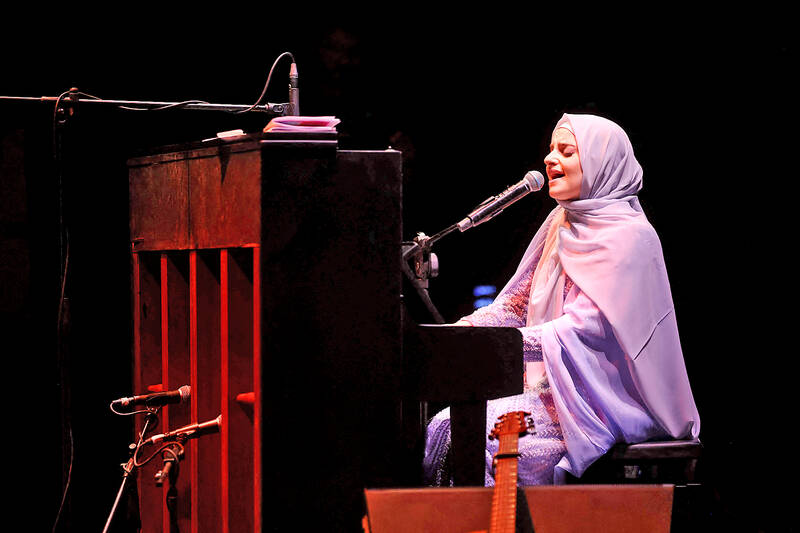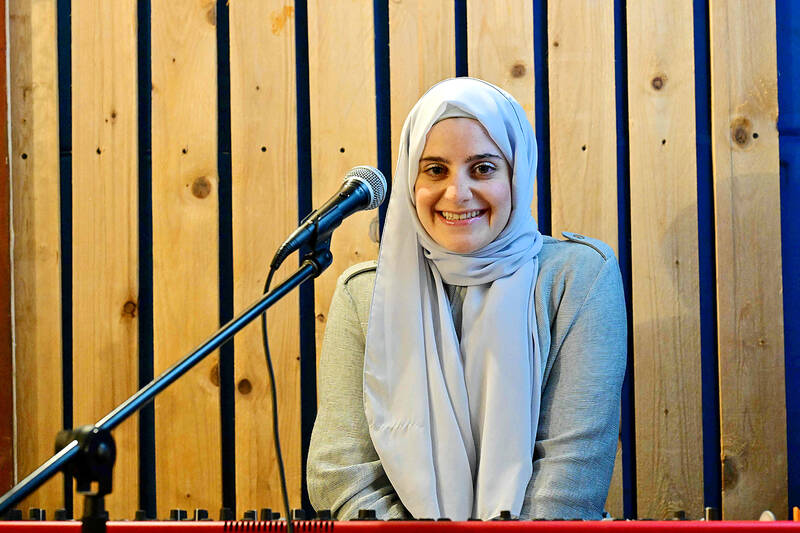In a Dubai recording studio, hijab-clad Ghaliaa Chaker tuned her guitar and belted out original songs as she builds a career that is turning heads for more than just her music.
The 26-year-old Syrian, who was raised in the United Arab Emirates (UAE), has become a social media sensation, with 437,000 followers on Instagram and millions of views on her YouTube channel.
She offers not only a unique sound, but also an unusual look in a region where artists who wear the hijab are few and far between.

Photo: AFP
“I hope that I have paved the way for other” hijabi singers, Chaker said at the studio. “It is a very beautiful thing to know that you have ... given a push to a girl who has many dreams and is unable to achieve them because she has never seen another girl do the same thing.”
Chaker, a keen motorbike rider who is part of an all-hijabi biker squad in Dubai, began composing and writing lyrics at the age of 16.
She drew inspiration from Nedaa Shrara, a veiled Jordanian singer who won the Arabic version of The Voice in 2015.

Photo: AFP
Shrara had stirred controversy among some Arab fans who were not accustomed to seeing a singer wearing the head covering.
For Chaker, who said she often receives criticism online, Shrara was a symbol of “self-confidence.”
After seeing her, “I said to myself that I can do it too,” Chaker said.
Chaker’s first song, composed in English, was picked up by Dubai radio stations in 2018, marking the start of her musical career.
She now sings mostly in Arabic, as young talents with innovative sounds are rising in the regional music scene.
The green-eyed singer said the headscarf had never been an obstacle in her life.
“There is nothing that I have wanted to do and not done because I wear the veil,” Chaker said.
However, the issue of women singing has always been controversial in conservative Islamic societies.
Although the Koran does not explicitly prohibit singing, or ban women from performing music, some religious academics frown upon the idea, viewing it as immodest.
Chaker said her immediate family has always supported her, but relatives in Syria were “very surprised at first,” mainly because they feared how people would react.
She said she receives a lot of “negative comments” on social media, including from family and friends.
“It bothers me of course, but I try to remember the positive comments and how much people love my music,” she said.
Chaker traces her artistic influences to her early upbringing in Al Ain, a former desert oasis and now a city in Abu Dhabi, one of the UAE’s seven sheikhdoms.
At home, her father blasted Arab singers such as Fairouz, an iconic Lebanese singer, and Egyptian diva Umm Kalthoum, while Chaker’s mother preferred Western music including Elvis Presley, she said.
“The music mixture in the house was always rich,” she said, influencing her sound which she describes as a mix of R&B, hip hop, electro pop, indie and jazz.
A multi-instrumentalist, Chaker credits her father with her love of the drums, guitar and piano, all instruments that she plays.
Instead of gifting her toys as a child, he would buy her new instruments, she said.
The Middle Eastern darbuka drum is “the closest to my heart because I often played it with my father who loves it very much and it is the basis of oriental rhythm,” she said.
The singer, who performed in the Lebanese capital, Beirut, last month, said she wants to take her music beyond the Middle East.
“It is very important to me that my music is heard in Europe, in America, in Australia, in the whole world, maybe even in Latin America,” she said, adding that she aspires to “collaborate with many artists from different countries.”
“It is time for the Western world to know how beautiful our music is,” she said.

THE ‘MONSTER’: The Philippines on Saturday sent a vessel to confront a 12,000-tonne Chinese ship that had entered its exclusive economic zone The Philippines yesterday said it deployed a coast guard ship to challenge Chinese patrol boats attempting to “alter the existing status quo” of the disputed South China Sea. Philippine Coast Guard spokesman Commodore Jay Tarriela said Chinese patrol ships had this year come as close as 60 nautical miles (111km) west of the main Philippine island of Luzon. “Their goal is to normalize such deployments, and if these actions go unnoticed and unchallenged, it will enable them to alter the existing status quo,” he said in a statement. He later told reporters that Manila had deployed a coast guard ship to the area

HOLLYWOOD IN TURMOIL: Mandy Moore, Paris Hilton and Cary Elwes lost properties to the flames, while awards events planned for this week have been delayed Fires burning in and around Los Angeles have claimed the homes of numerous celebrities, including Billy Crystal, Mandy Moore and Paris Hilton, and led to sweeping disruptions of entertainment events, while at least five people have died. Three awards ceremonies planned for this weekend have been postponed. Next week’s Oscar nominations have been delayed, while tens of thousands of city residents had been displaced and were awaiting word on whether their homes survived the flames — some of them the city’s most famous denizens. More than 1,900 structures had been destroyed and the number was expected to increase. More than 130,000 people

A group of Uyghur men who were detained in Thailand more than one decade ago said that the Thai government is preparing to deport them to China, alarming activists and family members who say the men are at risk of abuse and torture if they are sent back. Forty-three Uyghur men held in Bangkok made a public appeal to halt what they called an imminent threat of deportation. “We could be imprisoned and we might even lose our lives,” the letter said. “We urgently appeal to all international organizations and countries concerned with human rights to intervene immediately to save us from

RISING TENSIONS: The nations’ three leaders discussed China’s ‘dangerous and unlawful behavior in the South China Sea,’ and agreed on the importance of continued coordination Japan, the Philippines and the US vowed to further deepen cooperation under a trilateral arrangement in the face of rising tensions in Asia’s waters, the three nations said following a call among their leaders. Japanese Prime Minister Shigeru Ishiba, Philippine President Ferdinand Marcos Jr and outgoing US President Joe Biden met via videoconference on Monday morning. Marcos’ communications office said the leaders “agreed to enhance and deepen economic, maritime and technology cooperation.” The call followed a first-of-its-kind summit meeting of Marcos, Biden and then-Japanese prime minister Fumio Kishida in Washington in April last year that led to a vow to uphold international